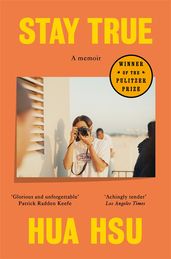Stay True: the quietly radical power of books about friendship
Leah Cowan explores what makes books about friendship so compelling, and what they offer us in a time when connection and community can feel increasingly scarce.

Hua Hsu’s Pulitzer-winning memoir, Stay True, is an affecting portrait of his friendship with college classmate Ken, who died less than three years after they met. Leah Cowan discusses its quiet power, and that of other books about friendship: testimonies to what can come of human connections made without an endgame in sight.
According to Aristotle's biographer, he once responded to the question “what is a friend?” with the simple maxim: “A single soul dwelling in two bodies”. The concept of friendship was a hot topic in Ancient Greece: Socrates and Plato also dedicated considerable stacks of wax tablets and scrolls of papyrus to the subject. These philosophers considered friendship to be precious, even virtuous, and deeply enriching. Ideas about friendship continue to evolve and endure into the present day. Finessing the relevant social skills to make and keep friends is generally understood as a positive attribute, while being friendless is a ‘red flag’. For many of us, friends become part of the vital fabric of our lives, providing constancy and stability while other elements of life such as jobs and romantic partners are rotated in and out. For people who for a range of reasons cannot rely on the bonds of biological family, friends can make up our ‘chosen’ family. It is perhaps this life-giving magic of friends, who, like lighthouses, guide us home through storms, that draws us towards stories that centre these relationships.
The driving locomotive of Hua Hsu’s memoir, Stay True, is the author’s relationship with his college friend, Ken. As the friendship between the two men develops, they provide gentle wayfinders through each other's lives. While this friendship often takes the amorphous shape of ‘hanging out’ – in cars, on rooftops, in AOL chat rooms and in parking lots – Hua’s memoir refutes the idea of friendship as being “casual and transient”. Friendships change us; they challenge us and stretch us. Friendships yank us out of bed and drag us to social gatherings we’d rather avoid. They also provide a salve to the unavoidable troughs of the human condition: heartbreak, tragic loss, existential crises, tedious jobs and bad haircuts.
‘Friendships change us; they challenge us and stretch us. Friendships yank us out of bed and drag us to social gatherings we’d rather avoid. They also provide a salve to the unavoidable troughs of the human condition: heartbreak, tragic loss, existential crises, tedious jobs and bad haircuts.’
Stay True is at its most tender where it depicts friendship as this multi-functional space: a place of sanctuary where Hua and Ken can be vulnerable with each other through lowering defences necessarily erected in the face of the huge structures of inequality. The author reflects on the nuanced differences between himself and Ken, and the ways in which their friendship grew from an initial wariness; Hua is Taiwanese-American and his parents moved to the US in the 1960s, while Ken is Japanese-American and his family had lived in the US for many generations. Hua is, at first, unsettled by Ken’s ease and lack of neuroticism. He also grows to appreciate how his friend allows him to bury himself in his ultra-discerning music taste and zine-making instead of socialising or pursuing romantic interests, while also detecting the insecurity lurking behind these facades. As Hua muses, “maybe this is what is meant to be known, this feeling of being exposed and transparent”.
As we emerge from a global pandemic that has re-prioritised mutual aid and the need to reach out and hold each other, stories that chronicle the radical power of deep friendship are being warmly embraced. From titles such as Gabrielle Zevin’s decade-spanning Tomorrow, and Tomorrow, and Tomorrow, to Imogen Binnie’s road trip novel Nevada, and Elena Ferrante’s Neopolitan Quartet that secured a cult following, stories about friendship affirm the power of connection and community. In many of these novels, friendships emerge out of chance encounters – in hospital playrooms, over dolls exchanged in the street, and on the road. Society does not necessarily encourage us to seek friendship, but these are bonds that we forge nonetheless. These stories also speak to a disrupting of the idea of ‘romance’ as something limited to couples. The relationships that unfold almost serendipitously are brimming with the romance of rituals, shared adventures, and mutual support.
‘These stories also speak to a disrupting of the idea of ‘romance’ as something limited to couples. The friendships that unfold are brimming with the romance of rituals, shared adventures, and mutual support.’
A recurrent scene in Stay True depicts Hua and his friends driving aimlessly around at night singing along to mixtapes. Despite Hua’s irritation at his passengers’ toneless singing, these trips provide the ultimate exercise in appreciating the ‘journey’ of existence without obsessing over the destination. Friendship enables us to be present in this way – there isn’t a social script for the end goal of ‘friendship’. There are no weddings between friends; no photoshoots in a dappled woodland setting to mark milestones; no divorce papers to legally dissolve friendships. Hua and Ken’s connection is a counterbalance to these social markers that shuttle us into marriages and nuclear families so that we can form productive social units. While Hua wears a communist star on his coat and buries himself in political theory, it is his friendship with Ken that is the living and breathing defiance of capitalism; simply hanging out, goofing around and loving each other without objective temporarily disrupts the need to ‘be productive’. Stories that place friendship at their beating heart are a testimony to what happens when we lean into the quiet nourishment of human connection without the expectation of a particular outcome. Stay True provides a welcome tonic to the imperative that we must always be ‘doing’ and ‘achieving’ – it reminds us that friendship flourishes in the spaces where we can simply ‘be’ with one another.
Stay True
by Hua Hsu
Winner of the Pulitzer Prize in Memoir.
When Hua Hsu first meets Ken in a Berkeley dorm room, he hates him. But despite his first impressions, Hua and Ken become friends, a friendship built on late-night conversations over cigarettes, long drives along the California coast, and the successes and humiliations of everyday college life. And then violently, senselessly, Ken is gone, killed in a carjacking, not even three years after the day they first meet. Capturing a coming-of-age cut short, and a portrait of a beautiful friendship, Stay True is a deeply moving and intimate memoir.



